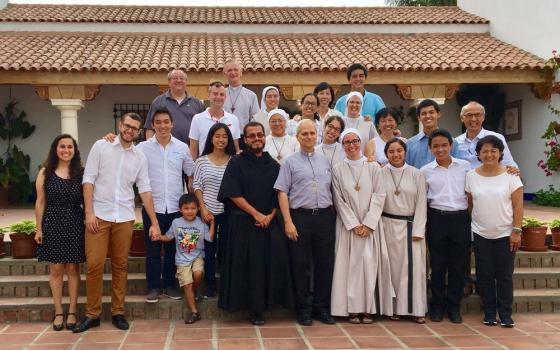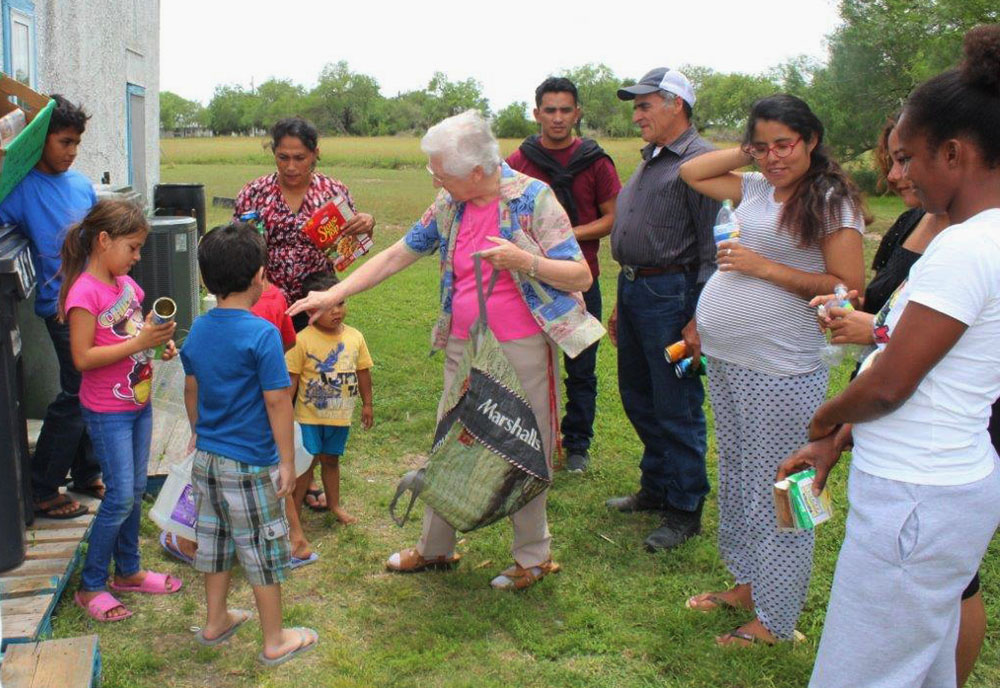
Sr. Thérèse Cunningham of the Sisters of the Holy Spirit and Mary Immaculate, center, spends pre-pandemic time with guests at La Posada Providencia, an emergency shelter for refugees, asylum-seekers and those fleeing life-threatening conditions, in San Benito, Texas. (Courtesy of Alejandra Zepeda)
At the Gateway International Bridge that links Brownsville, Texas, to Matamoros, Mexico, a group of volunteers and Catholic sisters pull portable carts with diapers, tents, food and supplies. They cross the border into Mexico on foot, a small caravan of about 10 to 20 people. Their destination is the migrant camp on the other side, where asylum-seekers wait in tents for their chance to plead their cases before an immigration judge.
As the pandemic rages around the United States, most people curtail their social interactions to minimize their risk. These sisters, many in their 70s, have taken on more.
"They would provide a shoulder to lean on, provide the people an opportunity to tell their story [and] of course, a lot of hugs and kisses and spiritual, moral support," said Sergio Cordova, co-founder of Team Brownsville, a nonprofit that provides aid to immigrants on the U.S.-Mexico border.
After the Trump administration enacted the Migrant Protection Protocols, or the "Remain in Mexico" policy, in January 2019, more than 60,000 asylum-seekers, a third of whom are children, were forced to wait for their U.S. court dates on the Mexican side of the U.S.-Mexico border. As a result, informal camps emerged.
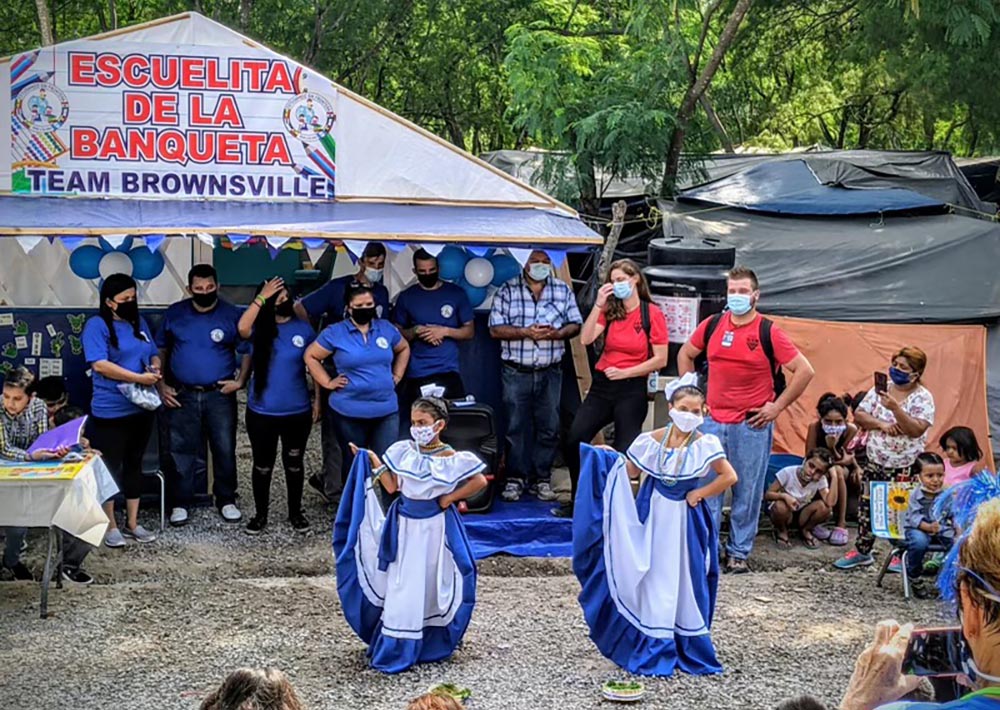
Children in blue and white dance at the school opening in the migrant camp in Matamoros, Mexico. (Courtesy of Jacinta Powers)
As sisters accompany those in migrant shelters, take donations to those in camps and orphanages, or host immigrants along the border, they hear firsthand the tragic stories that forced people to flee for the United States seeking asylum only to be deported instead. For those who qualify, immigration proceedings are on a loop of delays or cancellations — made more dangerous by the pandemic.
"Each time, they go [to court] with the hope of some kind of answer of what comes next, and it ends up being a cycle of court dates," said Sr. Christa Parra, an Institute of the Blessed Virgin Mary sister in El Paso, Texas, who accompanies asylum-seekers in a migrant shelter in Juárez, Mexico.
"The system is set up to discourage people from waiting," she said. "So, waiting is a form of resistance."
Sr. Norma Pimentel, executive director of Catholic Charities of the Rio Grande Valley, said she believes authorities from both countries have "utilized the virus to their advantage." The encampment in Matamoros, which at one point surpassed 3,000 migrants in 2019 because of changing immigration policy and border restrictions from the pandemic, now contains about 500, according to Global Response Management, a nonprofit that provides medical services in the camp.
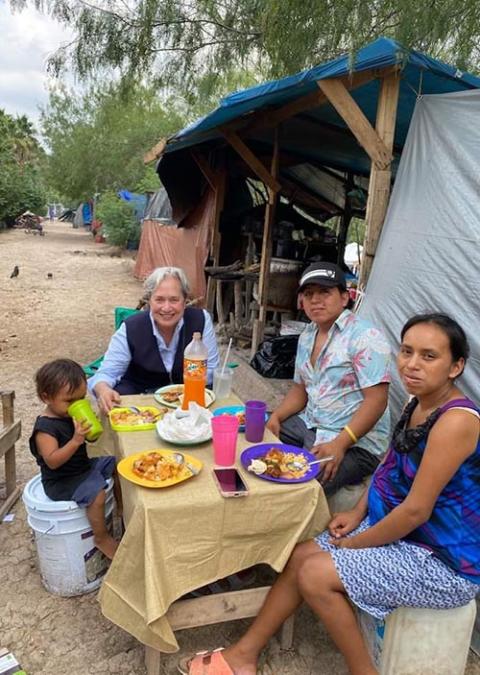
Sr. Norma Pimentel, second from left, says she is always deliberate about visiting the families and sharing a meal on her trips to the migrant camp in Matamoros, Mexico, in the pandemic. The Missionary of Jesus said she never just drops things off. (Courtesy of Sr. Norma Pimentel)
The governments aren't considering "the good or the safety of the families," but rather, the responsibilities they don't want to shoulder, said Pimentel, a 67-year-old Missionaries of Jesus sister. "They find it more convenient to just say, 'Nobody's allowed to enter the United States' or 'Nobody's allowed to enter the camp anymore.' "
That worries her. She knows well the many stories of immigrants fleeing violence, like Merín, a 31-year-old Honduran mother who only wanted to use her first name to protect herself from those who had once targeted her.
She fled her country with her 16-year-old son after getting death threats from her husband. Along the way, she became pregnant from a new partner, while her son, whose own life was also threatened, sought asylum as an unaccompanied minor in the U.S., she said. Soon, she followed, and gave birth Nov. 22, 2020, with the help of Border Patrol agents shortly after she crossed the Rio Grande.
Pimentel said receiving people fleeing violence like Merín, especially those with babies and children, is always an emotional encounter.
"We rejoice, and we can see the tears in their eyes, how happy they are, [but] at the same time how difficult it had been, how they struggled, how they feared something could happen to them, and then finally being in the U.S.," she said. "There's a sense of joy."
Andrea Leiner, the director of strategic planning for Global Response Management and an emergency medicine nurse practitioner, praised Pimentel's ability to connect with immigrants and coordinate aid. When Mexico did not ask the United Nations to manage the camp, a usual practice when large numbers of refugees gather, Pimentel stepped into the vacuum that emerged, she said.
"Sister Norma really stepped into one of the leadership roles," Leiner said. Pimentel coordinated local government and aid organizations to form a "cohesive strategy" and to help shape an "effective response."
Pimentel said when she is in the camp, sharing in the lives of the migrants, her "faith comes alive, and it makes sense."
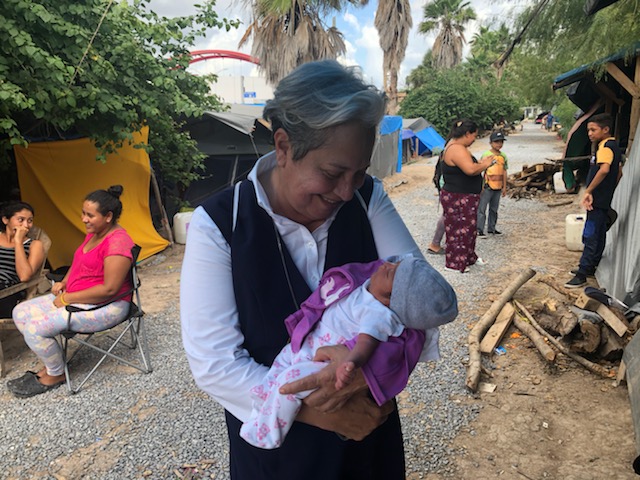
Sr. Norma Pimentel with her godchild at the migrant camp in Matamoros, Mexico, during the pandemic. The baby's birth, like most births at the camp, posed a risk to the mother and baby, as medical attention is not a given. (Courtesy of Sr. Norma Pimentel)
Although only essential workers are allowed to cross the border, Pimentel manages access when she visits Matamoros with donations at least three days a week. She never just drops things off; she always visits and shares a meal with the families. One named her the godmother of their newborn.
Pimentel said the camps are a difficult place to start a new life. Their tents are freezing at night, and their bodies ache from months of sleeping on the ground. The days are typically hot, wet and muddy, and rats have infested the encampment.
"It's sad, but at the same time, it's a part of their life," Pimentel said. "They make the best of it."
It took two weeks for Rosa to get to the U.S. border from San Pablo Tacachico, El Salvador, which she fled Aug. 31, 2019. She and her then-4-year-old son were sent immediately to the Matamoros camp upon reaching the United States. In the year she was in the camp, the 28-year-old mother, who only wanted to give her first name, reluctantly built a life and a business selling pupusas (a Salvadoran flatbread) thanks to Pimentel, who occasionally brought Rosa supplies.
Rosa said cooking and selling food helped her get by, but it was far from her Salvadoran career in hydroelectric operations, a politically fraught job where she eventually doubted her safety, ultimately fleeing north with her son. After her year in Matamoros, she crossed illegally into the United States and hopes to find work despite her immigration status.
Advertisement
"The truth is, people on [the U.S.] side have no idea what it's like to live there, the daily suffering," Rosa said of the camp. "That's not a life for anyone. ... Everyone who has passed through there is marked by it."
'Feeling of despair' in border shelters
Parra's daily roundtrip drive from her home in El Paso to a shelter in Juárez has become a sacred part of her day, a reminder of the stark realities that straddle the international border.
Since October, Parra, 39, has been accompanying asylum-seekers in Juárez who, because of the Migrant Protection Protocols, await their ever-delayed court dates.
"There can be a feeling of despair," Parra said of the unknowns that haunt each person. Simply weighing their few options — to wait out the case or to risk danger, either by crossing illegally or returning to the lives they fled — "is overwhelming to think about."
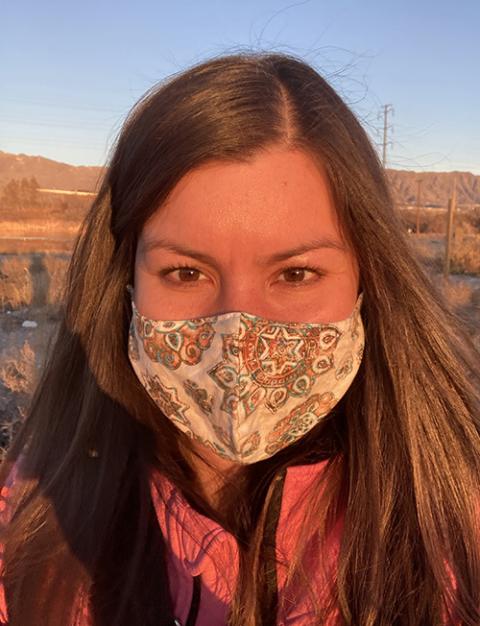
Sr. Christa Parra, an Institute of the Blessed Virgin Mary sister in El Paso, Texas, who accompanies asylum-seekers in a migrant shelter in Juárez, Mexico (Courtesy of Sr. Christa Parra)
At the shelter, Parra's rotating duties include teaching nightly English classes, offering pastoral accompaniment or connecting migrants with humanitarian legal services. Their biggest need, she said, is making sense of their cases and documentation.
"It's a lot of listening throughout the day, not just with my ears, but with my heart," Parra said.
On the opposite end of the same Texas-Mexico border, Sr. Thérèse Cunningham, 75, teaches English-as-a-second-language classes and life skills to immigrants at La Posada Providencia in San Benito, Texas.
La Posada is an emergency shelter sponsored by the Sisters of Divine Providence of Pittsburgh that hosts refugees, asylum-seekers and those fleeing life-threatening conditions. Most are homeless, having left their families and home countries because of violence.
"There have been times when I have been at the table with at least 13 different countries represented," said Cunningham, a Sister of the Holy Spirit and Mary Immaculate.
La Posada's 10-acre site is "a very peaceful, tranquil environment for healing. ... It's like a little jewel," Cunningham said.
However, the pandemic and the Migrant Protection Protocols brought some changes. Previously, Cunningham and another sister from her community gave lessons in a room that held about 12 people. Now, they teach one-on-one. They enforce quarantines, masks and social distancing and have not had an outbreak yet.
Although COVID-19 death counts are rising in Texas, Cunningham, an Irish immigrant, is determined to continue the work she began 15 years ago, helping people like the 19-year-old Somali who got his GED diploma in three months and is now working in Kentucky.
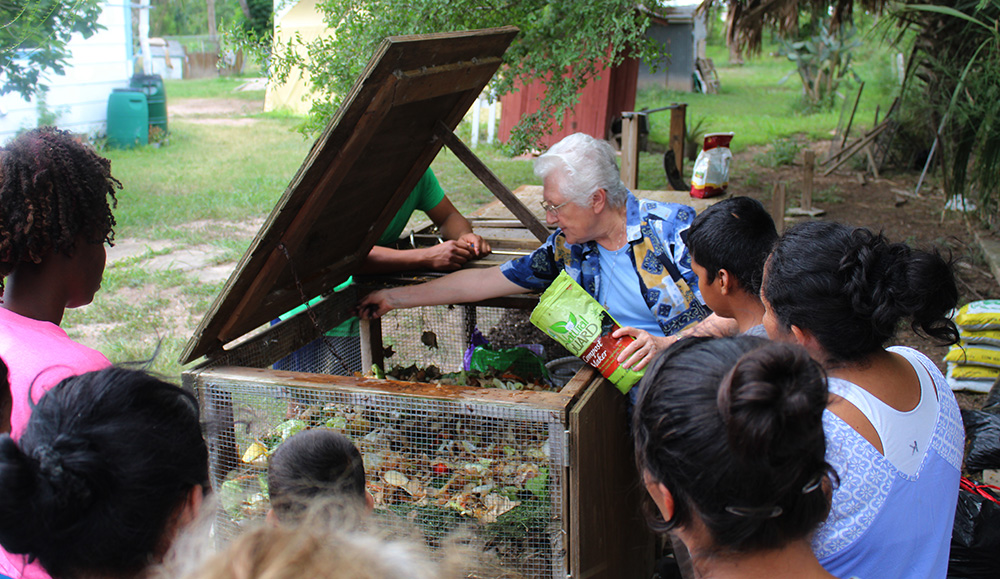
Sr. Thérèse Cunningham of the Sisters of the Holy Spirit and Mary Immaculate, center, teaches guests at La Posada Providencia in San Benito, Texas, how to compost using a bin of fruit peels before the pandemic. (Courtesy of Alejandra Zepeda)
But the pandemic is not the sister's only concern after she witnessed the Trump administration's "harsh and unjust" policies.
She described how a Honduran mother separated from one of her children used to sit under a tree at a picnic table and cry.
"She was so distraught," Cunningham said. "I could tell on most days she wasn't able to focus on anything. Her heart was broken from the separation."
About a month later, through the efforts of lawyers, she was reunited with her child to "great rejoicing."
Retreating from Mexico to help from the US
Although some sisters have worked along the border for years, Sr. Jacinta Powers, 66, and Sr. Mary Alice McCabe, 79, had shorter missions, crossing daily to the Matamoros camp. Powers, an Ursuline Sister of Mount St. Joseph and registered nurse, went to treat the sick; McCabe, a Sister of Notre Dame de Namur, delivered supplies. Both have since returned to their communities for different reasons.
When Powers arrived at the border in January 2020, COVID-19 had not yet reached the United States. Six days a week, she crossed Brownsville's Gateway International Bridge, treating skin rashes and gastrointestinal issues.
Although coronavirus cases increased across the United States, the illness didn't affect as many in the camp.
"Nobody got that sick," though approximately 10% tested positive for COVID-19, Powers said. The field hospital erected to treat coronavirus patients was never used and eventually dismantled.
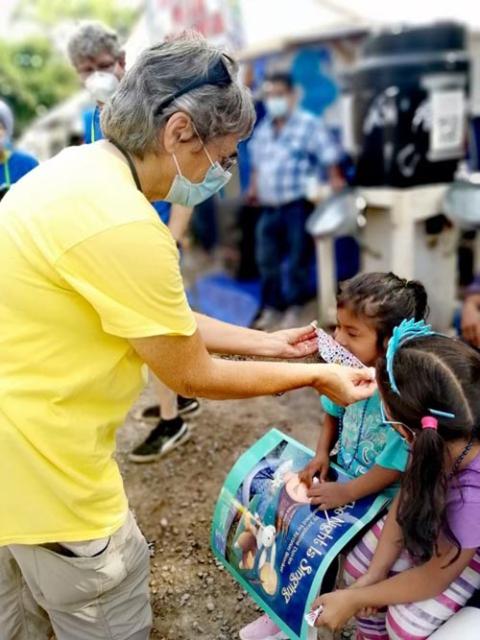
Ursuline Sr. Jacinta Powers puts a mask on a child at the migrant camp in Matamoros, Mexico, so the girl could go to school. (Courtesy of Jacinta Powers)
Powers credits the flow of fresh air around the campers — and the hand of God.
"There's no way those folks would have not had some really, really sick people with COVID like you see in the States except for God's divine intervention," Powers said.
Sisters from McCabe's congregation began their border work in early 2018. Before the start of the pandemic, teams of three or four sisters out of 40 rotated from various cities to a mobile home they leased in Alamo, Texas, 57 miles from Matamoros. At first, they helped Pimentel at her respite center, but when the Migrant Protection Protocols were enacted, they helped shuttle supplies to immigrants who were subjected to what McCabe called the "illegal and totally inhumane" immigration policy.
"These nun groups have been so instrumental in helping and providing not just the physical needs but also ... the spiritual needs of the people: provide them with hope and prayer and sustenance," Team Brownsville's Cordova said. Their presence, he said, also demonstrates to migrants that people in the United States do care about them.
When COVID-19 cases erupted in the spring of 2020 and cross-border travel was limited to essential workers, McCabe said, she and her team were labeled nonessential and could not cross. They returned to their communities but kept the mobile home, hoping to return.
As a nurse, Powers is considered essential and continued her treks to the camp until her mission ended in November.
One particular little girl caught her attention, a 2-year-old from Guatemala who inconsolably cried, "Mamá, Mamá!" She learned the little girl's mother was killed on the way to the United States. Her uncle drowned in the Rio Grande, and her grandfather was later killed in Guatemala.
"It was just one tragedy after another," Powers said.
Despite all this, the girl's great-grandmother's faith never wavered, something Powers said she saw again and again in the camp.
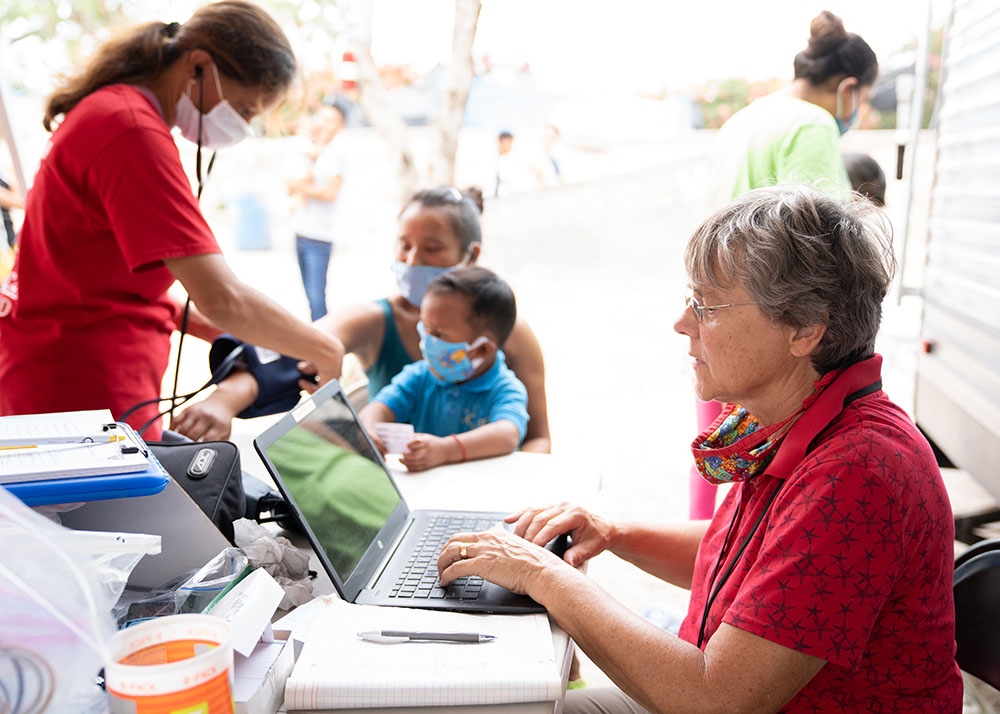
Ursuline Sr. Jacinta Powers at work at the migrant camp in Matamoros, Mexico (Courtesy of Lexie Harrison-Cripps)
"It provided me such a witness of people's faith in God that they would depend on God for such bare existence," Powers said. "Their joy just radiated out of sparks I would see every day."
After Powers' mission ended, she returned to her community in Maple Mount, Kentucky, inspired by the "sense of brotherhood" she witnessed.
McCabe said she and her sisters currently donate funds to nonprofits working with immigrants. They faithfully watch the news, hoping for changes that would allow them to continue their work.
"We are not young women, and we can't get on a plane and fly down," McCabe said. But "if the border opens, we'll just drive down and get there."
'These folks are an asset'
Undeterred by surging COVID-19 cases, Sr. Ursula Herrera, 72, continues to cross the Rio Grande, making regular food and supply deliveries to a home for special-needs adults and an orphanage in Piedras Negras, Mexico. Despite her age, Herrera — a Benedictine Sister of Boerne, Texas — returns again and again. If someone at one of the homes has a potential COVID-19 exposure, she is always warned to stay away, she said.
Herrera said she feels a responsibility to those she serves. Among them are the 23 special-needs adults at Casa Bethesda to whom she delivers food, money, diapers and daily supplies such as trash bags.
"She's a companion on the path, but she's no ordinary companion; she's like an angel to us," said Paulino Esquivel, the Baptist pastor who founded the home 26 years ago.

Benedictine Sr. Ursula Herrera buys food to distribute in Piedras Negras, Mexico. She makes regular food and supply runs to a home for special-needs adults and an orphanage on the Mexico side of the U.S.-Mexico border. (Courtesy of John Bivens)
Although donors come and go, Esquivel said Herrera has never abandoned them.
"She comes representing her God and my God," Esquivel said.
Children used to run up and greet her van at the orphanage, Casa Nazareth, as well as the colonias she serves, but since the pandemic, she said, "things are much quieter." If she's been warned COVID-19 may be present in a household, she passes envelopes with scholarship money through her vehicle's open window.
Along with her Mexico work, she and volunteers prepare meals at the Caridad de Corazón mission house that provides shelter for immigrants in Eagle Pass, Texas, where she has lived for 20 years. Twenty to 40 people used to stay each night, but since the Migrant Protection Protocols were enacted, it's down to two to four.
"President Trump set the border issue back," Herrera said, later adding, "We need to look at our country and see these folks are an asset."
After she met a Honduran bus driver who barely escaped an assassination attempt while driving his route, Herrera and other sisters gathered and translated articles describing the violence these drivers face to bolster his asylum case. His family was allowed to stay, but he had a previous deportation and was nine months shy of the 10-year mark when he could return to the United States.
"Bus drivers are being shot, and yet we keep sending them back," Herrera said. "How can we do that?"
Despite the challenges and risks, Herrera has no plans to stop her work.
"The people that are donating have it in their hearts as to where that money should go," she said. "I need to do my part to complete their mission."
[Soli Salgado is a staff writer for Global Sisters Report. Her email address is ssalgado@ncronline.org. Follow her on Twitter: @soli_salgado. Nuri Vallbona is a freelance documentary photojournalist. For much of her career, she worked at the Miami Herald, and she has been a lecturer at the University of Texas since 2013. Follow her on Twitter: @nurivallbona.]


